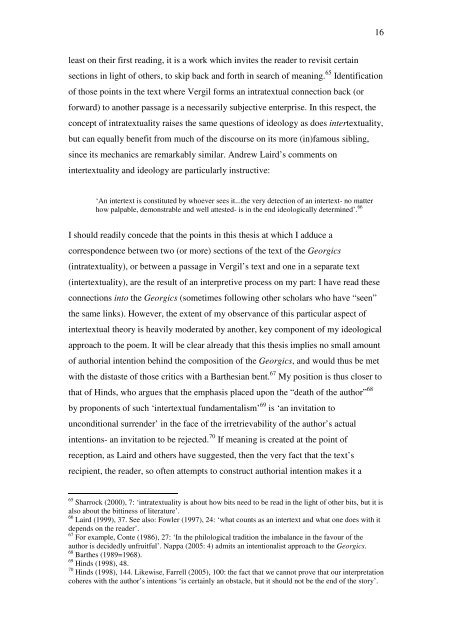Adam Bunni PhD thesis - Research@StAndrews:FullText ...
Adam Bunni PhD thesis - Research@StAndrews:FullText ...
Adam Bunni PhD thesis - Research@StAndrews:FullText ...
You also want an ePaper? Increase the reach of your titles
YUMPU automatically turns print PDFs into web optimized ePapers that Google loves.
least on their first reading, it is a work which invites the reader to revisit certain<br />
sections in light of others, to skip back and forth in search of meaning. 65 Identification<br />
of those points in the text where Vergil forms an intratextual connection back (or<br />
forward) to another passage is a necessarily subjective enterprise. In this respect, the<br />
concept of intratextuality raises the same questions of ideology as does intertextuality,<br />
but can equally benefit from much of the discourse on its more (in)famous sibling,<br />
since its mechanics are remarkably similar. Andrew Laird’s comments on<br />
intertextuality and ideology are particularly instructive:<br />
‘An intertext is constituted by whoever sees it...the very detection of an intertext- no matter<br />
how palpable, demonstrable and well attested- is in the end ideologically determined’. 66<br />
I should readily concede that the points in this <strong>thesis</strong> at which I adduce a<br />
correspondence between two (or more) sections of the text of the Georgics<br />
(intratextuality), or between a passage in Vergil’s text and one in a separate text<br />
(intertextuality), are the result of an interpretive process on my part: I have read these<br />
connections into the Georgics (sometimes following other scholars who have “seen”<br />
the same links). However, the extent of my observance of this particular aspect of<br />
intertextual theory is heavily moderated by another, key component of my ideological<br />
approach to the poem. It will be clear already that this <strong>thesis</strong> implies no small amount<br />
of authorial intention behind the composition of the Georgics, and would thus be met<br />
with the distaste of those critics with a Barthesian bent. 67 My position is thus closer to<br />
that of Hinds, who argues that the emphasis placed upon the “death of the author” 68<br />
by proponents of such ‘intertextual fundamentalism’ 69 is ‘an invitation to<br />
unconditional surrender’ in the face of the irretrievability of the author’s actual<br />
intentions- an invitation to be rejected. 70 If meaning is created at the point of<br />
reception, as Laird and others have suggested, then the very fact that the text’s<br />
recipient, the reader, so often attempts to construct authorial intention makes it a<br />
65<br />
Sharrock (2000), 7: ‘intratextuality is about how bits need to be read in the light of other bits, but it is<br />
also about the bittiness of literature’.<br />
66<br />
Laird (1999), 37. See also: Fowler (1997), 24: ‘what counts as an intertext and what one does with it<br />
depends on the reader’.<br />
67<br />
For example, Conte (1986), 27: ‘In the philological tradition the imbalance in the favour of the<br />
author is decidedly unfruitful’. Nappa (2005: 4) admits an intentionalist approach to the Georgics.<br />
68<br />
Barthes (1989=1968).<br />
69<br />
Hinds (1998), 48.<br />
70<br />
Hinds (1998), 144. Likewise, Farrell (2005), 100: the fact that we cannot prove that our interpretation<br />
coheres with the author’s intentions ‘is certainly an obstacle, but it should not be the end of the story’.<br />
16

















